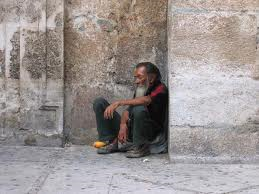This post isn’t about cancer, but approximately, in one way or another, the last 30 entries are, so just click backwards if that’s what you’re looking for.
The reason I’m writing this post is because I’m raising money for charity – it happens to be the charity I work for – as I train for the 5K of the Pittsburgh Marathon while fighting cancer and undergoing chemo. Sometimes, in working in the nonprofit world (as I have for 14 years) I come across some interesting, as well as (what feel, to me, like) strange questions and comments. I thought I would take the opportunity to address some of them since I have a nice, growing little audience here.
GIVING MONEY TO HOMELESS PEOPLE
Do not do this. Typically, pan handlers are soliciting your hard earned money for drugs or alcohol. That is the honest truth. These people know about the nearby shelters and soup kitchen – which they may or may not need. They sometimes are part of larger, more sophisticated operation, too. You run the risk of funding a criminal operation or someone’s individual drug habit (as one former addict told me “you can be the person who gives them the money for the hit that kills them.” Think about THAT next time you want to hand someone a five dollar bill.) What to do instead? I recommend steering clear, just for safety reasons – you don’t want to get entangled in someone’s need for a drug fix or their mental illness if you aren’t experienced in relating to people who are living on the street. But if you feel confident engaging, just talk to them, offer to buy them a sandwich, give them a granola bar or a bottle of water. Let them know about local shelters, even though they probably already do. I think treating these people as human beings even though they might be trying to scam you is really important. As a side-note, I feel totally different about busking (someone playing music for money.) I almost always toss whatever is in my pocket in their container. Especially if it’s any good. Hey, at least they’re providing a service of some kind. But keep this in mind regarding pan handling and busking – these aren’t the official opinion of anyone but myself. BOTTOM LINE: If you want to give, give to a charity you trust that helps these people. That will do the MOST good.
WHY DO CHARITIES NEED PAID STAFF?
This one is amazing to me. Occasionally people ask me if I get paid a salary. In my organization, we serve over 120,000 meals a year, assist over 1,000 individuals in need of food, shelter, counseling, education assistance, job training and mental health supports. This stuff does not get done when a couple of volunteers feel like showing up and giving a few hours of their time. While our volunteers who serve food, mentor clients and process our donations are invaluable and deeply appreciated, this is a 24-hour per day operation that requires professional counselors, case managers, pastors, experienced fundraisers, an accountant, an HR professional, administrative staff, maintenance staff, experienced front desk staff who put themselves at risk to keep the rest of us safe, chefs, child care providers to spend quality time with recently homeless children, a PR professional, a database manager, etc. It really is an involved operation to bring in enough revenue to keep the lights on and the cupboards full, to respond to emergencies, to welcome hungry, cold people day or night, to answer the phones, run the events that bring in needed revenue, fix the computers and help volunteers get plugged in. For the most part, these are professional individuals who could work elsewhere for more money. But we believe that this work is worth our full-time, fully comitted efforts. No one is getting rich here, believe me. But we care enough to do it anyway.
AREN’T HOMELESS PEOPLE JUST LAZY?
Sure, some of them are. But some of them are incredible, interesting, funny, smart, caring people who have sustained significant trauma and/or made some big mistakes. Let’s talk about how a homeless person gets to be homeless. Typically, people who end up homeless are either addicted to drugs and alcohol or are quite mentally ill. The mentally ill are people who are generally in need of medication, but for a variety of reasons cannot or do not maintain their medication schedule and cycle through a variety of mental struggles that lead to socially unacceptable behavior or debilitating fears and paranoia. They obviously are not able to maintain employment and housing and since there are almost no resources in institutional settings (i.e. being “committed”) they are often left to themselves once family cannot or will not care for them, and the individual may feel safest away from other people. They may stay in a rural area like a tent in the woods or they may end up in an urban setting under a bridge. They maintain survival that is acceptable to them. It is hard to reach these people and build trust, but sometimes we can and it’s a win if we can get them into temporary housing and eventually set up with (typically government provided) housing and care.
Addiction is a different story. Often, this begins early in life with trauma. Abuse, neglect, abandonment are major triggers. These inflict pain. Pain is avoided by dabbling in drugs and alcohol. Some people have a greater propensity toward addiction than others (I believe it’s always a choice to some degree, but that some have a bend toward uncontrollable addiction than others do) and down the rabbit hole, they go. Employment can be difficult to maintain. Eventually family relationships deteriorate and friendships do too, besides those “friendships” that center around the addiction. People can live this way for a surprisingly long time. When they do find their way to a place like Light of Life where they can be helped, they are taking a big step – choosing to make an effort at totally redefining their lives. These people are anything but lazy. They are beginning the hard work of dismantling a network of walls they’ve built in the name of self-preservation and tackling the mental, emotional and spiritual work needed for healing and restoration. It’s not easy. They are basically turning over control to people they don’t know, in the hopes we will lovingly walk them through what will be one of the most challenging things they will ever go through. Not only do we care for them – we care for their children in many cases. These are kids who have come home to Mom overdosing on the couch, or waiting for Dad to come home for three days.
It’s not easy work to walk alongside these men and women who are rebuilding their lives, and I give all the credit in the world to our staff who do this. I have done it myself in positions I have held in other organizations and it is challenging, rewarding but draining work. You give much of yourself each day and it can take a toll. Please pray for our staff who give so much of themselves over to our ministry.

